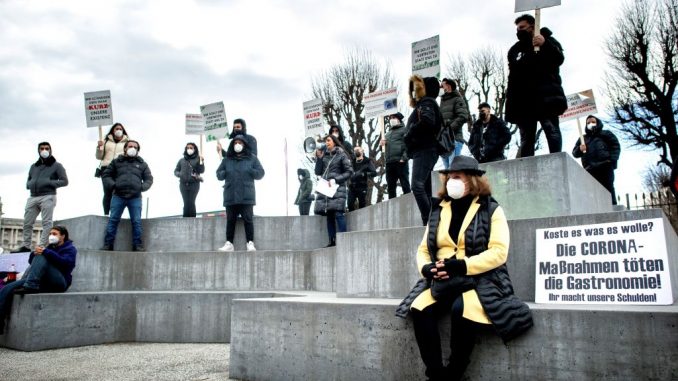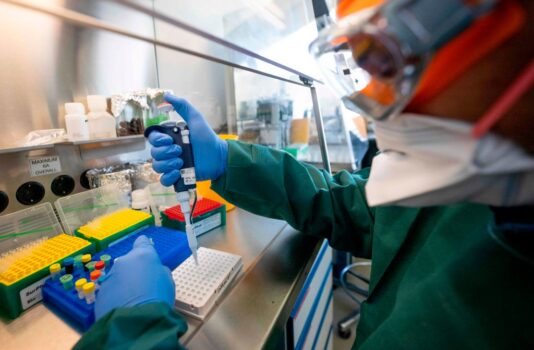
Commentary
On Mar. 24, the Administrative Court of Vienna upheld an action by the Freiheitliche Partei Österreichs (FPÖ)—the Austrian Freedom Party, the third-largest political party in the country—against a ban by Viennese police on a planned public assembly.
The rally was due to take place on Jan. 31 but was banned due to fears it could lead to an exponential spread of COVID-19.
In upholding the FPÖ’s action, the judge reiterated that all people have a fundamental right to meet, and to protest freely and peacefully. This right cannot be infringed for any reason that is not in accordance with the law.
The judge hearing the matter, Doktor Frank, held that the reasons for banning the assembly had no basis in law and were invalid.
The prohibition on the FPÖ gathering was put into place following declarations by Austrian health authorities, warning of the high transmissibility of the UK strain of COVID-19. There were also concerns from police, health officials, and security services that social distancing and mask-wearing requirements would not be respected by Party members.

More significantly, the ban was further justified based on an increasing number of positive PCR test results to COVID-19. PCR, or polymerase chain reaction testing, is considered the “gold standard” for diagnosing COVID-19.
In his reasons, the judge reviewed the justifications given by Austrian health authorities for the ban, focusing particularly on their lack of clarity and confusing terminology.
The authorities listed the number of COVID-19 cases in the country, positive test results, and infections as reasons for the ban. The judge ,however, found this approach was inappropriate from an epidemiological point of view.
In his finding, he referred to the World Health Organizations’ Information Notice for IVD Users 2020/05, released on Jan 20, 2021—which gives guidance on how nucleic acid testing (NAT) technologies should be used to detect SARS-COV-2—and states that a positive test result alone is no indicator of illness and must be considered along with other factors.
Thus, Frank found that it was unclear what figures health authorities were relying on to justify bans on public gatherings.
This lack of clarity is related to several factors,including the number of viable amplification cycles before testing became inaccurate (amplification cycles refer to the “molecular copying” of DNA fragments upon which the PCR test method is based), and also the high error rates of testing on asymptomatic patients.
The judge also emphasised that only doctors were professionally trained for diagnosing illness or infection, not politicians.
Frank referred to a statement by the inventor of PCR tests Dr. Cary Mullis, who stated that PCR tests are not to be used for diagnostic purposes and do not, of themselves, indicate whether a person is ill or infected.
The judge also referred to a 2020 study: Predicting Infectious Severe Acute Respiratory Syndrome Coronavirus 2 From Diagnostic Samples, where the authors confirmed that PCR tests were not determinative of the illness.
In this regard, the judge questioned the number of amplification cycles utilised in the tests, noting that after 24 such cycles, the test is practically useless for diagnostic purposes. At that point, the test cannot demonstrate whether the virus can reproduce itself and could result in false positives.
The WHO Information Notice admitted as much, saying that “as disease prevalence decreases, the risk of false-positive increases.” The judge also noted that a series of positive test results of asymptomatic individuals also had an extremely high rate of error.
This was explained in a recent report by The New York Times. The PCR test provides a simple yes-no answer to the question of whether a patient has the virus.
To do so, the test amplifies genetic matter from the virus in cycles; the fewer cycles required, the greater the amount of virus, or viral load, in the sample. The greater the viral load, the more likely the patient is to be contagious.

The number of amplification cycles needed to find the virus, called the cycle threshold, is never included in the results sent to doctors and patients,. However,it could tell them how infectious the patients are.
In three sets of testing data that include cycle thresholds, compiled by officials in Massachusetts, New York and Nevada, up to 90 percent of people testing positive carried any virus.
Tests with high thresholds may detect not just a live virus but also genetic fragments—leftovers from infections that pose no particular risk. This is akin to finding a hair in a room long after a person has left.
The judge found that exclusive reliance by Austrian health authorities on PCR and antigen test results to justify their actions was not sufficient epidemiological justification in the circumstances.
Accordingly, the court found that the police and health authorities had not established a valid basis for prohibiting the Party’s assembly.
Frank added, tellingly, that fear alone could not justify blanket prohibitions, especially when they relate to a right so fundamental as freedom of assembly.
The significance of this decision cannot be underestimated.
It goes to the very basis of the justification for authorities to implement lockdowns and other restrictions on individual liberty, which the court found lacked support from a scientific and epidemiological perspective.
Lord Jonathon Sumption in Britain has been consistently arguing against lockdown measures for the best part of a year.
Appeals against restrictions on freedom of movement and assembly—justified based on positive PCR test results—have also been lodged in courts in Berlin and Rome.
Rocco Loiacono is a Senior Lecturer at Curtin University Law School in Perth, Australia, and is a translator from Italian to English. His work on translation, linguistics, and law have been widely published in peer-reviewed journals. This article was compiled in collaboration with Eva Wiesmann.
Views expressed in this article are the opinions of the author and do not necessarily reflect the views of The Epoch Times.





Be the first to comment